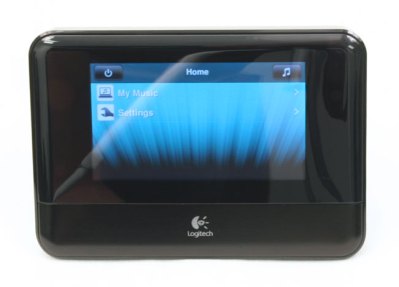“Logitech’s Squeezebox Touch makes streaming music from the Internet or PC on your stereo even easier with an intuitive touch screen interface.”
- Convenient touch-screen
- Apps for Pandora, Rhapsody and much more
- Powerful Internet Radio search.
- Handles high resolution audio
- Analog Audio outputs sound bright
- Large Bezel
- Screen should be bigger
- Spendy
- Did we mention the price?

Introduction
When we saw Logitech’s first iteration of the Squeezebox at the 2007 CEDIA Expo, we knew they were on to something. Back then, customizable internet music services like Pandora were just beginning to gain popularity, but Logitech believed that we would soon want a device that allowed us to integrate our digital music collection with the growing possibilities of internet-based music.
Since then, Logitech has steadily improved their Squeezebox brand and, today, offers the Squeezebox Touch: A touch-screen Wi-Fi enabled music server that provides easy access to your digital music collection, internet radio stations and paid internet music services like Rhapsody and Napster.
 Out of the Box
Out of the Box
The Squeezebox Touch comes packed with a power cord, remote control, a set of stereo RCA cables and a very simple user manual. There’s no software disc and no need for a flash drive to update its firmware. Everything the user needs is built right in. The Squeezebox Touch is gloss black and has a very clean face, adorned only with Logitech’s logo. The bezels on the unit are a little large and tend to make the screen seem small in comparison to the device’s overall size.
Features and Design
The addition of a touch-screen to the Squeezebox makes operating the unit and navigating its menus extremely easy, never mind that it’s just plain cool to play around with. The 16:9 touch-screen measures about 4.3” diagonally and brightens or dims based on ambient lighting. When needed, a virtual keyboard not unlike the one found on the iPhone will pop up to allow easy data entry.
The Squeezebox Touch is designed to be integrated with an A/V receiver, powered speakers or headphones. On the back, the Squeezebox offers analog stereo outputs, optical and coaxial digital outputs, a headphone output, USB port, SD card slot and Ethernet connection.
Once plugged in and powered up, the Squeezebox Touch automatically searches for available wireless networks then prompts you to make a choice and enter a password. With wireless internet access secured, you’re already prepared to listen to music from a myriad of internet radio stations. To access music sites such as Pandora or Last.fm, or to listen to music stored on a home computer, further setup us required.
We set up access to our Pandora and Last.fm accounts by adding the appropriate apps from the Squeezebox menu. Once usernames and passwords are entered, access is instant. Enabling other music services such as Napster or Rhapsody involves the same setup process. Simply add the app, provide login information and get listening.

Since the Squeezebox Touch offers USB and SD card access, we connected a 2 gig USB flash drive loaded with uncompressed music. Access to this content was immediately available through the on-board menu under the “my music” heading.
The Squeezebox Touch is compatible with just about any operating system and will play back almost any music file type including high resolution 24 bit/ 96 Khz files and lossless/uncompressed files ripped from your CD collection
We connected our Squeezebox Touch to an Onkyo A/V receiver via both analog and digital connections and kept a pair of reference headphones handy as well. Total setup took about 20 minutes.
 Performance
Performance
The Squeezebox Touch’s touch-screen makes operating the device extremely easy. While the user interface isn’t particularly flashy or colorful, it serves its purpose well and is intelligible enough for novices. Headings and subheadings make sense, thus making access to a specific song or artist a snap. If you tire of using the touch-screen or just need access from across the room, a full function remote control is provided that allows menu navigation, volume control, a sleep timer, “home” key, shuffle, track advance and power on/off.
We started off our listening tests with one of our Pandora radio stations. We immediately noticed that, regardless of analog or digital audio connections, the fidelity of these streamed music files was much better than what we get from our iPhone and iPod Touch’s Pandora interface. Otherwise, the experience is identical to using Pandora’s website. We could view album art, thumbs up or down songs as necessary and get additional artist or track information at the touch of a button.
We then switched to our iTunes music library and selected one of the many available playlists. The experience was very similar to using iTunes. Album art is prominently displayed as is track progress, artist and song information. As we toggled between compressed and uncompressed versions of the same tracks, the difference in quality was obvious. The Sqeezebox Touch streamed the uncompressed and high resolution music with ease and didn’t spend any time buffering. Access was, again, immediate.

In terms of sound quality, we noticed an appreciable improvement when we used a digital connection to our receiver. The digital connection exposed more detail and depth from our high quality test tracks than the analog connection was capable of. We were pleased to see that, even with a digital connection, the Squeezebox’s on-board volume control was still functional. This allowed us to move about the room with just one remote in tow- a nice convenience feature.
We have just a couple of minor gripes with the Squeezebox Touch: The server software that we installed on our home computer for iTunes access was resource intensive. We found it was taking up a big portion of our PC’s RAM. For those with less than up-to-date computers, the server software may choke up performance a bit and, since the server software isn’t easily disabled, this may become more than just a minor inconvenience. Also, though the Squeezebox can access music files outside the iTunes library, we noticed that the server software only allowed us to monitor ONE folder at a time. This made integrating music outside of our iTunes library more complicated since we were only able to access either iTunes OR Windows media files at once, not both. Finally, the audio output of the Squeezebox was a little bright for out taste, even through the digital audio connections. While this won’t be a problem for most listeners, some audiophiles may balk at the somewhat flashy sound.
Conclusion
The addition of a touch-screen to Logitech’s already comprehensively featured Squeezebox music player goes beyond “cool factor” to make the user interface much more intuitive and easier to use than previous generations. Armed with the capability to play back just about any music file, easy access to internet music content, simple set up, flexible audio outputs and a bunch of other little goodies, the Squeezebox Touch is the internet music player to beat. Big Kudos to Logitech for integrating a useful touch-screen feature without inflating the cost of the player.
The biggest issue people are going to have with the Squeezebox Touch is the price. At $300, you could buy an iPod dock for your receiver at half the price and get similar features. Or, simply buy a used laptop and connect it to your receiver that way, plus you will get more use out of it as a whole. Plus, at this price point the screen should be bigger considering the large bezel.
If money is no object and you want something small and sleek to add more music options to your system, the Squeezebox Touch works great. Those more value-minded will want to go with an alternative option however.
Highs:
- Convenient touch-screen
- Apps for Pandora, Rhapsody and much more
- Powerful Internet Radio search.
- Handles high resolution audio
Lows:
- Analog Audio outputs sound bright
- Large Bezel
- Screen should be bigger
- Spendy
- Did we mention the price?






